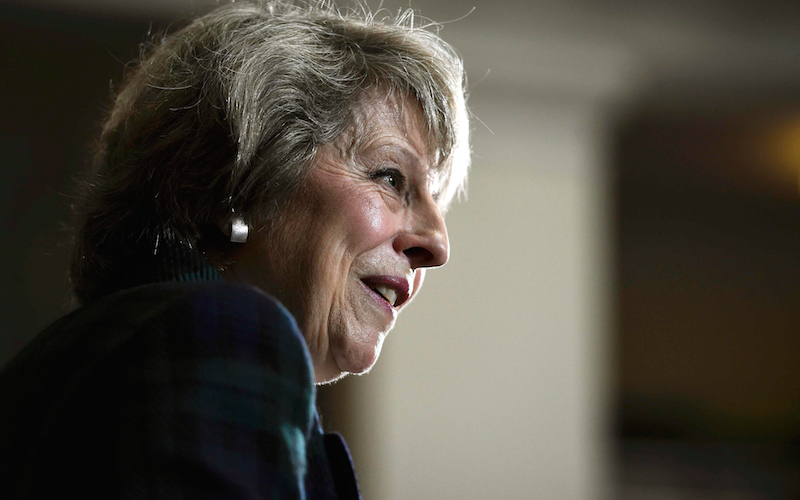
Why Theresa May Needed to Get On with Brexit
Before Theresa May told the British public when she would be invoking Article 50 (by next March), the chorus of voices accusing the Conservative government of wasting time on triggering Brexit had grown deafening. In the days running up to the Conservative Party conference, even the Institute for Government unveiled a new briefing paper with the not-so-subtle subtitle “Silence is not a strategy.”
In addition to claiming the new ministries need an additional staff of 500 (costing £65 million a year) to handle the Brexit proceedings, the paper castigated the “turf wars” within the Cabinet for wasting time as well as energy.
Her recent pronouncements alleviate that pressure for now, but how long will that last? Only now, a full three months after the scramble for power following David Cameron’s resignation, does the government appear to have a solid idea of how to go about the process. Of course, the Brexit “vision” May touted in her conference speech didn’t go any further than laying out the bullet points of hard Brexit, namely control over immigration (which presumably means an exit from the single market) and the repeal of European laws from British books.
Alongside that red meat, however, the Prime Minister still gave lip service to maintaining “maximum freedom to trade with and operate within the single market,” a courtesy she surely knows Brussels will deny her. In all likelihood, May is actually angling to wean the UK off its dependency on the European market and build economic partnerships with other parties.
Forgetting the EU
The decision to lay out a Brexit timeframe was Theresa May’s best choice out of a set of bad options. Her previous stalling strategy brought its own serious pitfalls, not the least of which was the dampening effect uncertainty had on business activity in Britain. While a number of investment banks in London had already decided to pull staff out of the city before May’s announcement, the Bank of England revealed companies across Britain were scaling back investment and recruitment as a result of the uncertainty. Ambiguity left the economy in an interminable holding pattern; instead of making decisions and long-term plans, businesses waited for a better idea of what the future had in store.
That awkward limbo extended well beyond Britain itself. The Brexit campaign has repeatedly promised a “global Britain,” but that future can not materialize without plausible, sound negotiations. American officials have already said the US won’t consider a trade deal before Brexit is finished, and other former colonies (namely India and Australia) will put potential agreements into place after the UK-EU divorce is complete. The reasoning is straightforward: since the UK has thus far relied on the EU’s common external tariff for non-EU goods, starting free trade negotiations made no sense if nobody knew what tariffs they would be negotiating.
“Relaxed informal” talks with free trade partners and interlocutors at the WTO were all well and good, but anything beyond that would have essentially been a futile exercise. Now that Britain’s exit date from the European Union (March 2019) and status of membership in the European tariff regime have seemingly been confirmed, representatives on all sides have a much better idea of what they are actually discussing.
Even with the uncertainty, of course, some potential partners already had demonstrated their eagerness to forge ahead. Saudi Arabia and its partners in the Gulf Cooperation Council (GCC) have been taking advantage of the “Brexit discount” to make UK investments with a favourable exchange rate. The GCC countries are also making noise about a free trade agreement with the UK, which is understandable considering the impasse in their talks on free trade with the wider EU. Saudi Arabia’s Mohammed bin Salman took advantage of the G20 summit in China to broach the issue with Theresa May, and Whitehall has apparently already identified Riyadh as a “priority market” for its post-Brexit plans. However, as enthusiastic they might be, everyone’s hands will remain tied until negotiations with Brussels are at least underway.
On a personal level, May’s reluctance to implement an outcome she disagreed with was easy to understand. With the hurdles that have to be overcome and the Cameron government’s non-existent preparations for the outcome, even a little extra time to sort out matters on the British side might have seemed worth the trouble. In the long run, however, whatever breathing room May bought herself with the “Brexit means Brexit” approach was not going to make all that much difference. Worse, the cloud of uncertainty she was fostering had its own ill effects on the economy.
In her speech, she pointed out again that Brexit was the will of the British people and that her government’s job was to follow through on that decision. There was really no other way.

